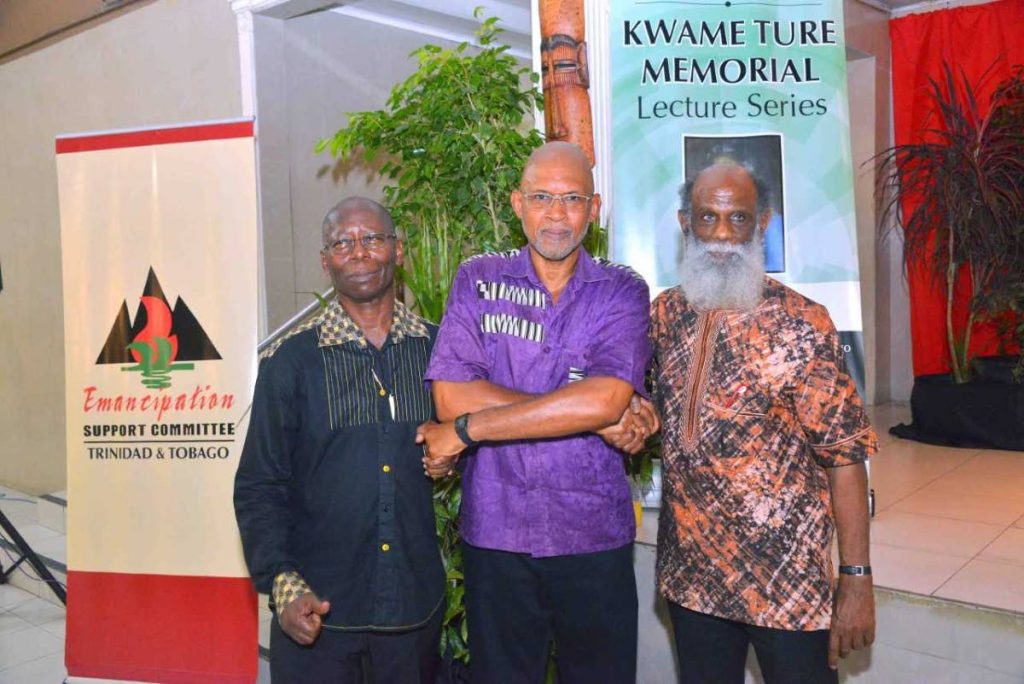Prof: 'Wakanda' rooted in African history

ALTHOUGH US film director Ryan Coogler presented the celebration of African heritage through the acclaimed movie Black Panther, it is clear that Wakanda drew its inspiration from a real place after all.
Professor Anthony Browder, feature speaker at the launch of the Kwame Ture Memorial Lecture Series and Film Festival, believes Coogler purposely left breadcrumbs in the Marvel movie, connecting the dots to the 25th Dynasty of ancient Egypt, an indigenous African civilisation which established its greatness over more than 3,000 years. Browder, a US archaeologist and cultural historian, established these connections when he spoke at the Lions Civic Centre on June 16.
“Ryan Coogler was teaching ancient African history,” Browder said to a packed audience. “Black Panther’s Wakanda is rooted in African history and mythology.”
Wakanda, the fabled country of technology and riches in the Black Panther film, exhibits parallels to Waset, the cultural, spiritual and technological capital of Kemet, ancient Egypt, Browder said. The popularity of the movie created a movement that awakened consciousness, developed a heightened sense of awareness, African pride and confidence, said a media release from the Emancipation Support Committee of TT.
“All we have to be is our authentic self,” said Browder, a professor of Africana Studies at the University of Maryland, who is the author of best sellers From the Browder File and Nile Valley Contributions to Civilisation.
The discussion on Wakanda was just part of his presentation Unearthing Africa’s Past: Empowering Us to Shape the Future. Earlier in his discourse, he provided insight into his archaeological dig in Egypt where he is excavating and restoring dynastic tombs.
As the first African American to lead such an exploration there, he emphasised that it is important to discard the prevailing interpretation of African history.
“We have to revisit the idea of enslavement. When we pour libations, we pay tribute to our ancestors and they hear us as we continue to do the work, to show the truth,” he said. “To not know what happened before your ancestors were enslaved is to always remain eternally a slave.”
Over the past 12 years, the tomb of Kushite noble Karakhamun has been the focus of Browder and his team. He said this was his cosmic assignment. So far, they have excavated a hall 20ft underground, several other rooms and limestone staircases going deeper underground and the entrance to the tomb. Now, the team is in the restoration stage. Restoring these ancient temples, and burial chambers to their former glory.
Since 1980, Browder has travelled to Egypt 54 times and has conducted 23 archaeological missions since 2009. He is currently the director of the ASA Restoration Project, which is funding the excavation and restoration of the 25th Dynasty Tomb of Karakhamun in Luxor, Egypt. The ASA Restoration Project was established in 2008 to honour the work of Dr Asa G Hilliard, III.
Browder’s three decades of study have led him to the conclusion that ancient Africans were the architects of civilisation and developed the rudiments of what has become the scientific, religious, and philosophical backbone of mankind.
The Kwame Ture Memorial Lecture Series and film festival was also launched with the viewing of The Man of the People, a short docu-film on Ture. “These are fragments of interviews with Kwame Ture before he left Trinidad for the last time,” said Caribbean film maker Yao Ramesar, who produced the documentary.Ramesar is the production co-ordinator of the UWI Film Programme.
Also to be screened will be Eyes on the Prize, Inward Hunger – Episode 3, If Beale Street Could Talk and Foot Prints of Pan Africanism. The film viewings begin at 7pm, every Thursday until July 25, at Nalis AV Room, Abercromby Street, Port of Spain. Admission is free.


Comments
"Prof: 'Wakanda' rooted in African history"